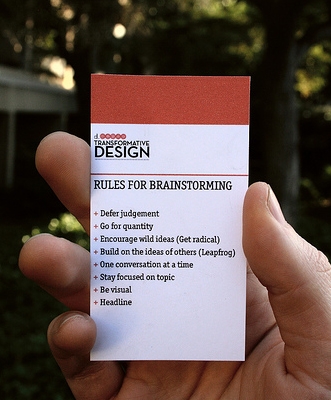
Here is a thoughtful post about whether or not brainstorming is a waste of time at Lateral Action. Don't miss the great picture. I am quoted as being for brainstorming, which is sort of true. My perspective on brainstorming is based on an 18 month ethnography at IDEO and from teaching innovation classes at the d.school classes for some years now. And here is an early post on this blog that is goes through some of the same things.
My perspective on group brainstorming boils down to three points that are reflected in those links and the academic article below. In short:
1. The academic research on brainstorming — the laboratory studies that are described as showing it doesn't work — are rigorous but irrelevant. They compare how many ideas individuals working alone versus versus working in groups can utter into a microphone in the same stretch of time. This is irrelevant and silly, as the practical norm that people take turns talking seems to explain why people are more productive alone — so this research rules out LISTENING TO OTHERS as productive behavior. Also, the way those studies are done makes it impossible for people to build on each others' ideas — because building on the ideas of others is impossible when you work alone. I would add that this is not a reflection of a bias against lab studies, and in fact, when I did a talk on brainstorming at the Stanford Psychology Department, the renowned lab researchers there thought that the research was equally silly. The notion that face-to-face meetings are not efficient way to get things compared to working along (and you need to waste all that time listening), but meetings do other things well, is not exactly a revelation, as the late Bob Zajonc pointed out during my talk.
Indeed, thinking about it right now, it is pretty funny that some professors, who as the word implies "profess" rather than listen, would design experiments in ways that treat listening as non-productive behavior.
2. Brainstorming by itself is a technique that people can do well or badly, and there is big variance in skill and leadership — something that even some lab studies that are labeled as being about brainstorming show. But I assert that brainstorming only makes a difference if it is part of a larger create process, as you see at IDEO, Pixar, and other places that do real creative work. If the group doesn't do some preparation and doesn't use the ideas generated — if they don't later battle over which are best, prototype some ideas, test them, try to implement them — then it is just a bunch of useless ideas and perhaps a fun meeting. So, for example, if you look at Tim Brown's Harvard Business Review article on Design Thinking, brainstorming is just one juncture in the process and in fact recognized as just one way to generate ideas (individual ideation is at least as important as group brainstorming). Note that brainstorming experiments nearly always have people generate ideas about things that participants have no expertise about and generate ideas that of no value to the participants, things like "what would you do with an extra thumb" or "how any uses are there for a brick."
3. Brainstorming is something that doesn't work well in organizational cultures that are very authoritarian, where people view meetings as places to crush others and their ideas, where people have trouble with ambiguity, or where people do not feel otherwise psychologically safe. It also should not be used by people who have no skill at doing it. For example, one story that hints at all of these comes from one of my students. He had a summer job at a company where there was a strict status hierarchy and people had trouble with ambiguity. A senior person called a one hour brainstorm. The first 30 minutes were spent arguing over which categories to put the ideas in, and after one idea was suggested, the next 30 minutes were spent arguing over which category to put it in. Then the brainstorm was over — this student was and is an excellent brainstormer, but as he was a summer intern, he really wasn't supposed to say anything. If you work at company like that, don't bother to try brainstorming.
In short, brainstorming does seem moderately useful in the right hands, in the right organization, and as part of a bigger creative process. I am ready to change my mind about this hypothesis if people have better facts, but the current research provides no clue about the value of brainstorming as it is done in the real world. For example, having fun and impressing clients aren't studied as legitimate performance outcomes in this literature. But keeping smart employees engaged and interacting with each other is valuable to organizations beyond any other value of brainstorming, and so is impressing clients. And as I said, these studies also treat listening as a waste of time.
Thoughts? Opinions?
P.S. The reference for my academic work on this is Sutton, RI; Hargadon, A
"Brainstorming groups in context: Effectiveness in a product design firm"
ADMINISTRATIVE SCIENCE QUARTERLY; DEC 1996; v.41, no.4, p.685-718